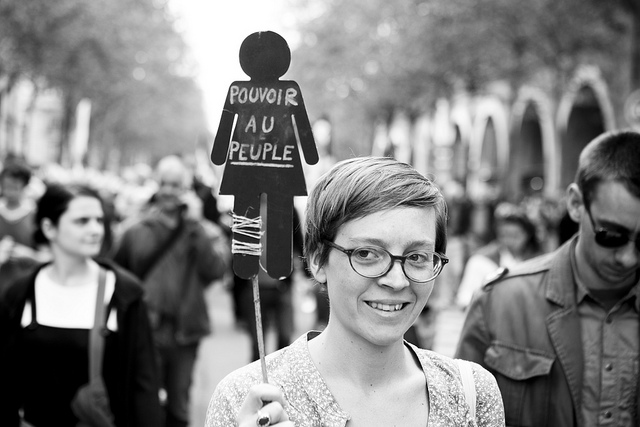Please support our coverage of democratic movements and become a monthly supporter of rabble.ca.
Hannah Arendt decried a modern world of loneliness with people absorbed by work and consumption. Where was civic life, public space, the “venture into the public realm,” participating with others in trust?
Arendt identified what has become a major problem for the European left: political apathy and indifference to civic duty, as revealed by voter turnouts of less than 50 per cent in the recent European parliament election.
European insurgent social movements and radical left political parties contest neoliberal globalization: street protests, demonstrations, petitions, manifestos, analysis and public meetings proliferate. At the same time, political demobilization weakens the social democratic left, in part a consequence of policies pursued by social democrats when in power.
On the left of the governing French Socialist party, the Front de Gauche represents an alliance between the French Communist Party and the Parti de Gauche (mostly ex-Socialists). Not an electoral force — it won three European seats compared to 24 for the extreme-right Front National (FN) — it has to show intellectual strength.
The anti-immigrant, anti-Islam, anti-Europe FN claims to have won the battle of ideas. It now refers to itself as the First Party of France, since the FN won more seats than the mainstream French parties in the European elections. However, its vote share represents only about 10 per cent of the population, since over half of the electorate stayed home.
It’s no coincidence the right-wing calls itself the National Front. The French left of the 1930s called itself the Popular Front. Its leader Socialist Leon Blum called for Bread, Peace, and Freedom. FN leader Marine Le Pen calls for patriotism, and praises long-time Communist leader Georges Marchais as an example.
Smart political rhetoric — the art of persuasion — worked for the right-wing resurgence of the 1980s, under Thatcher and Reagan. Aristotle characterized rhetoric as the appeal to character (ethos), emotion (pathos) or logic in dialogue (logos).
On both sides of the Atlantic, the victorious neoconservative right projected strong character with Thatcher as the Iron Lady, and appealed to emotion, Reagan announcing “it’s morning in America.”
Much as with commercial advertising, the ideas themselves mattered less than if they created belief. Focus on the leader created belief … without knowledge.
France in the 1980s elected a Socialist president, François Mitterrand, who ran on a program jointly agreed to with the French Communist party. His victory was a tribute to what opposition forces to the ruling right-wing had been arguing for years. Investment banks and industry needed to be nationalized and the workweek reduced. His opponents’ emotional appeal to anti-communism and anti-socialism failed with a slender majority.
Trying to beat the right-wing persuaders at their own game was what animated New Democrat Bill Clinton, and New Labour Tony Blair in the 1990s. By agreeing to the terms of the debate set by the right (reduce the deficit) and adopting the same language (individual responsibility), their Third Way allowed style to determine substance.
The European radical left of the 21st century has the task of setting a new agenda, and challenging the dominant political language, which the social democratic left has failed to do.
Philosopher Alain Badiou has described the role of the current French Socialist government as to explain once in power, why it cannot do what it said it would do when its was in opposition. He represents a small but interesting current of thought, a re-invention of communism, free of association with past political experience, drawing on the intellectual resources engendered by thinkers inspired by Karl Marx.
The new left of the 1960s was harshly critical of social democracy for its compromise with capitalism, and rejected communist party politics outright. “Actually existing socialism” in Eastern Europe was an object of disdain for failing to deliver freedom or prosperity, and operating a police state.
The student-driven movement of 50 years ago was anti-war, and the new left mobilized public opinion against the Vietnam invasion, helping force American power to withdraw in defeat. Rejecting militarism and recasting public spending in favour of the common good has to be a major element in the radical left program for the 21st century.
When French Socialist President François Hollande declares that while spending cutbacks are necessary, military expenditures are sacred, he demonstrates an inability to break with the French imperial past and a perverse attachment to NATO-style military action such as his right-wing predecessor authorized in Libya.
For its own sanity, the rest of the world needs the European left to lead in mounting a self-defence program against big oil, big finance, big pharma, big agro-industry, and corporate capitalist ethics.
The future of the European left means an alliance between red and green. Euro-socialists and Euro-ecologists need to work out a common program for humanity, based on justice, and the appeal to reason in discourse.
In a 1970 interview with Adelbert Reif, Hannah Arendt said that “what could pave the way for a revolution, in the sense of preparing the revolutionaries, is a real analysis of the existing situation….”
Duncan Cameron is the president of rabble.ca and writes a weekly column on politics and current affairs.
Photo: philippe leroyer/flickr



